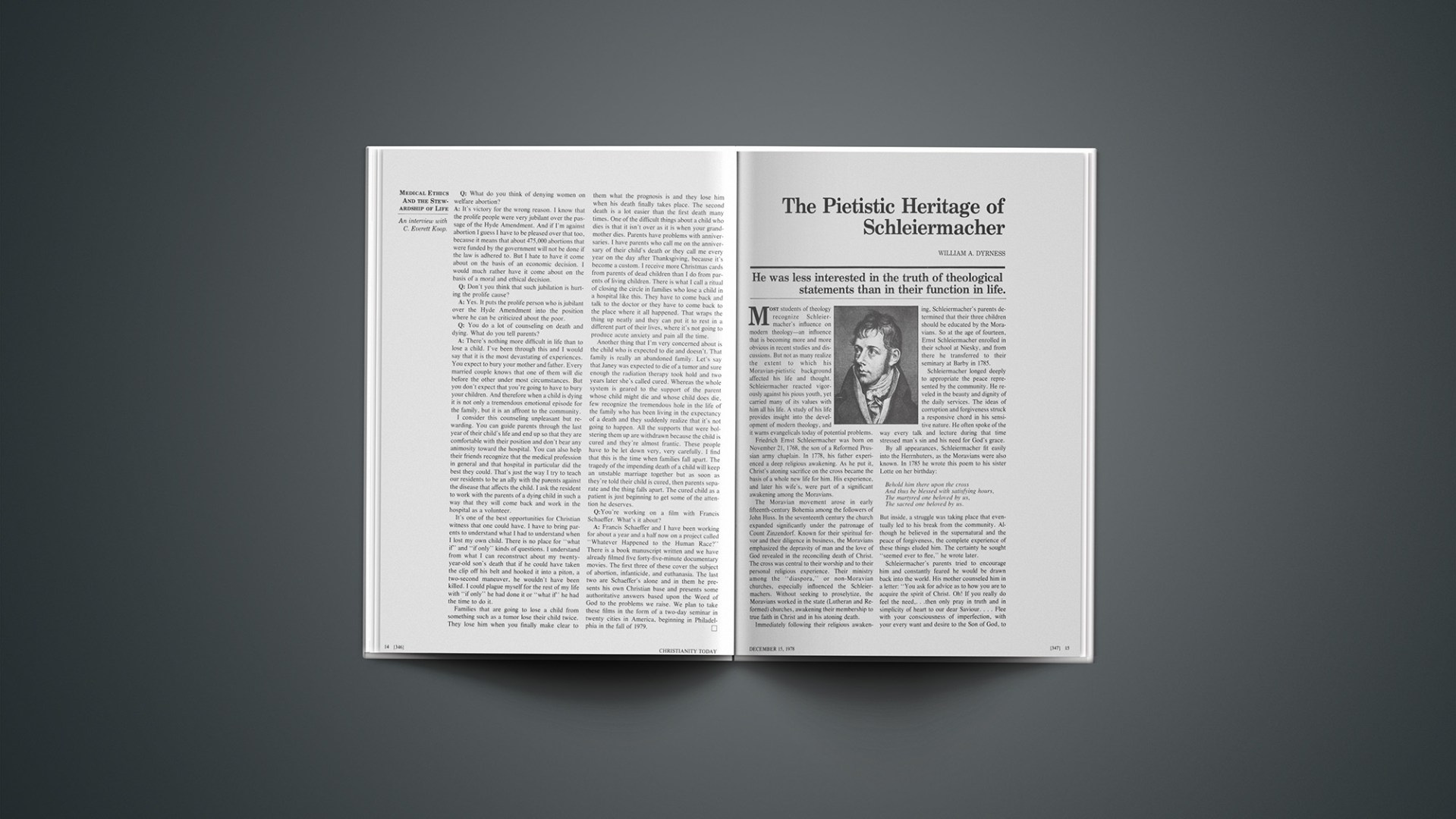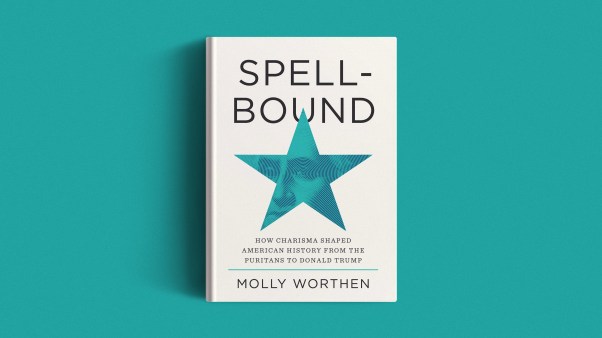Most students of theology recognize Schleiermacher’s influence on modern theology—an influence that is becoming more and more obvious in recent studies and discussions. But not as many realize the extent to which his Moravian-pietistic background affected his life and thought. Schleiermacher reacted vigorously against his pious youth, yet carried many of its values with him all his life. A study of his life provides insight into the development of modern theology, and it warns evangelicals today of potential problems.
Friedrich Ernst Schleiermacher was born on November 21, 1768, the son of a Reformed Prussian army chaplain. In 1778, his father experienced a deep religious awakening. As he put it, Christ’s atoning sacrifice on the cross became the basis of a whole new life for him. His experience, and later his wife’s, were part of a significant awakening among the Moravians.
The Moravian movement arose in early fifteenth-century Bohemia among the followers of John Huss. In the seventeenth century the church expanded significantly under the patronage of Count Zinzendorf. Known for their spiritual fervor and their diligence in business, the Moravians emphasized the depravity of man and the love of God revealed in the reconciling death of Christ. The cross was central to their worship and to their personal religious experience. Their ministry among the “diaspora,” or non-Moravian churches, especially influenced the Schleiermachers. Without seeking to proselytize, the Moravians worked in the state (Lutheran and Reformed) churches, awakening their membership to true faith in Christ and in his atoning death.
Immediately following their religious awakening, Schleiermacher’s parents determined that their three children should be educated by the Moravians. So at the age of fourteen, Ernst Schleiermacher enrolled in their school at Niesky, and from there he transferred to their seminary at Barby in 1785.
Schleiermacher longed deeply to appropriate the peace represented by the community. He reveled in the beauty and dignity of the daily services. The ideas of corruption and forgiveness struck a responsive chord in his sensitive nature. He often spoke of the way every talk and lecture during that time stressed man’s sin and his need for God’s grace.
By all appearances, Schleiermacher fit easily into the Herrnhuters, as the Moravians were also known. In 1785 he wrote this poem to his sister Lotte on her birthday:
Behold him there upon the cross
And thus be blessed with satisfying hours,
The martyred one beloved by us,
The sacred one beloved by us.
But inside, a struggle was taking place that eventually led to his break from the community. Although he believed in the supernatural and the peace of forgiveness, the complete experience of these things eluded him. The certainty he sought “seemed ever to flee,” he wrote later.
Schleiermacher’s parents tried to encourage him and constantly feared he would be drawn back into the world. His mother counseled him in a letter: “You ask for advice as to how you are to acquire the spirit of Christ. Oh! If you really do feel the need, … then only pray in truth and in simplicity of heart to our dear Saviour.… Flee with your consciousness of imperfection, with your every want and desire to the Son of God, to receive grace, yea, one after another, from his abundance” (Letters, vol. I, p. 26). His father meanwhile suggested he read books written by those who “understood the love and power of God who died for us.”
The struggle worsened. At age nineteen, after a long silence, Schleiermacher finally wrote to his father: “It pains me in the depth of my soul, that I must now announce to you something that will cause your hope [in me] to waver.… I cannot believe that He who called himself the Son of Man, was the true eternal God. I cannot believe that his death was a vicarious atonement, because he never expressly said so himself; and I cannot believe it to have been necessary, because God, who evidently did not create men for perfection but for pursuit of it, cannot possibly intend to punish them eternally, because they have not attained it” (pp. 46, 47).
Despite the pleas of his parents (“Who has deluded you?” his father wrote in desperation), Schleiermacher’s personal theology remained dubious. While preparing for his theological ordination exam he wrote to a former classmate: “I am afraid my guardian angel will take fright and fly away, when I shall have to give answers and speeches over theological subtleties that in my heart I laugh at” (Leben Schleiermachers, by Wilhelm Dilthey, p. 53). Schleiermacher left the community and began his studies at the great university at Halle in the spring of 1787. The distance in miles was short, but in thought Halle was another world. And so began the definitive development of the father of modern theology.
But why did he reject the peace and security of the seminary? What made him overturn his parents’ faith? Behind his confession to his father lay attitudes that would prove decisive in his thinking. The first reason for Schleiermacher’s rejection of his past was surely due to his conception of personal initiative and moral freedom. Schleiermacher reacted to his pietistic experience by affirming that each individual was responsible to fulfill and develop himself without coercion. This concept closely paralleled Enlightenment thinking to the extent that he would later refer to his entrance into Halle as the decisive moment in his development. For this was his “original act of freedom,” which allowed him to begin his process of self-discovery.
Thinking complete submission to the Moravian community incompatible with this emancipation, Schleiermacher wrote in his Soliloquies: “What reason have I to disdain anything that proceeds so readily and freely and happily from my inward being and its activity?” (ed. by Friess, p. 102). And this was precisely what his Moravian background, at least in Schleiermacher’s opinion, had done: In exalting God’s initiative it disdained human activity. So Schleiermacher felt compelled to leave the community.
Curiosity about the world also compelled him to leave. Likely, the stir created by Enlightenment thinking had penetrated the seminary at Barby. And because his teaching there lacked a positive doctrine of creation, this implied that many of the advances in science were contrary to the Creator’s intention, since they were not given in nature. No wonder Schleiermacher complained to his father that different views were not given a fair hearing at seminary. “How could I believe on mere assertion,” he wrote, “that all objections raised by our modern theologians and supported by critical, exegetical and philosophical reasons were nought?” (Letters, vol. I, p. 57). To a young vigorous mind the newer views of the goodness and potential of the world were more appealing than a mentality of retreat from the world and an emphasis on depravity.
He expressed his feelings much later in a letter to his fiancée Henrietta von Willich: “Nature cannot indeed oppose [one’s] freedom, can force nothing upon one which is in reality foreign.… It rules with wonderful power over the combinations and relations between various energies and tendencies.… Let holy nature rule!” (Letters, vol. II, p. 143).
Here both of Schleiermacher’s objections to his Moravian background come to expression: the freedom of man and the teeming potential of nature. For Schleiermacher, man lives in happy interdependence with the world. This structure does not take the place of man’s relation to God (he was no pantheist), but it is the way in which man experiences his dependence upon God. Schleiermacher grounded his theology in this experience of joyful dependence at the core of man’s self-consciousness.
Nevertheless, the Moravians shaped some of Schleiermacher’s thinking. His ranking the primacy of the active religious life over doctrinal truth and his mystical tendencies developed from what he learned at Barby. In part, Schleiermacher’s error lay not only in what he rejected of his past but also in what he retained. As he himself put it in a letter of 1802: “I have become a Herrnhuter again, only of a higher order” (Letters, vol. I, p. 284).
For Schleiermacher the personal reality of religion was always more important than doctrine about Christianity. Like many modern evangelicals, he was always afraid knowledge would replace faith. As a result he seemed less interested in the truth of theological statements than in their function in the religious life. This led him to strange views of certain traditional doctrines. Schleiermacher thought the two natures of Christ, the Virgin Birth, and miracles in the New Testament were not so much false, as without value in developing Christian religious affections. (What you thought about them, Schleiermacher used to say, depended on your attitude to the New Testament documents, and Schleiermacher’s views were often quite traditional.)
Here lies one of the causes of the modern split between faith and history. It is the expression of the traditional pietistic elevation of life over thought. Schleiermacher errs at this point by insisting Christianity is not a belief about Christ but a life with him, while in fact it is both.
Schleiermacher’s pietistic influence, however, deserves our apreciation at one point. The young Schleiermacher had carefully observed the role of the elders in the Moravian community. They stood in the place of God, directing the growth of each member in his own personal faith and life with Christ. From this, Schleiermacher developed his conception of “formation,” the idea that had such an influence on the pedagogy pervading Europe and America. This idea marked a fundamental stage in the freeing of the individual from collective thinking—a stage allowing the personal growth that we take for granted today.
Finally, Schleiermacher’s Moravian background helped to shape his view that religious sentiment must permeate all of life. Significantly, in a day of Romantic nature mysticism, Schleiermacher repudiated nature religion. Quite early he confessed on this subject: “My religion is so through and through heart-religion that I have no room for any other” (Letters, vol. I, p. 194). When Joseph, at the close of the dialogue in Christmas Eve (1805), sums up the content of the Christmas message as “speechless joy” before which all words are inadequate, he is expressing the pietistic idea that all the reality of religion focuses on the personal experience of the heart with the Saviour. Schleiermacher came to believe that all theology is nothing more than the expression and elucidation of this pious feeling of dependence upon God. Here in one sense he never left the Herrnhuters.
How can we assess Schleiermacher’s reaction to his background? It may well be true that he misunderstood much of the teachings of the Moravian community—how much or how little would be the object of a separate study. In any case, Schleiermacher reflected the weaknesses of pietism. Wilhelm Dilthey in his biography of Schleiermacher notes that this form of Christianity devalues life, narrowing it to the limits of religious feelings so that nothing of the Christianity of Augustine, Pascal, or Bach can find expression. The real weakness of the Herrnhuters, says Dilthey, lay in their inability to allow the strong depths of emotion they awakened to acquire scientific and artistic direction. They failed to permit the realities of God’s creative and redemptive work in history to shape their religious life.
Schleiermacher’s search was to become the search of every modern person. Both in what he left and in what he retained, he helped initiate the search of modern theology for an authentic religious experience—one that is personally satisfying and yet truly integrative, one that fits the joy and tears of all human experience. Schleiermacher strained “to reconcile religion with the freedom of science and the beauty of life” (Leben Schleiermachers, p. 34).
Perhaps it was the weakness of pietism to suggest that this reconciliation is impossible in a fallen world. But Schleiermacher, for his part, failed to see how the death and resurrection of Christ can make such harmony possible. In his Christian Faith he says of Christ’s death: “These sufferings in themselves have only the loosest connection with His reaction against sin” (ed. by Mackintosh and Stewart, p. 436). For Schleiermacher, Christ’s real work made his life absolutely dependent upon God.
Perhaps in the end Schleiermacher knew better and returned to the teaching of his youth. For as he lay dying (in February, 1834) he called for communion and said: “I have never clung to the dead letter, and we have the atoning death of Jesus Christ, his body and blood. I have ever believed and still believe that the Lord Jesus gave communion in water and wine” (Letters, vol. II, p. 338).
Pietism at its best taught that faith in Christ’s work and an openness to life based on God’s revelation are far from incompatible; they are inseparable. Sadly, this view was not expressed to Schleiermacher by his Moravian community, and he did not believe such a compatibility was possible. Herein lies an example for evangelicals today. Reaction to a narrow exposure of theology that does not accurately represent the full scope of biblical and integrative faith can result in the perpetuation of the mistakes that befell Schleiermacher and that have reaped such a bitter harvest in modern theology.
G. Douglas Young is founder and president of the Institute of Holy Land Studies in Jerusalem. He has lived there since 1963.










